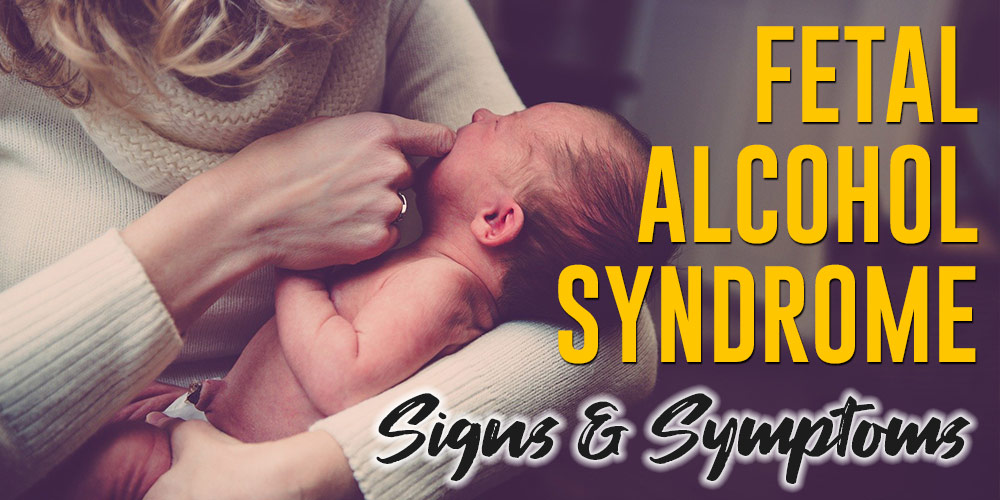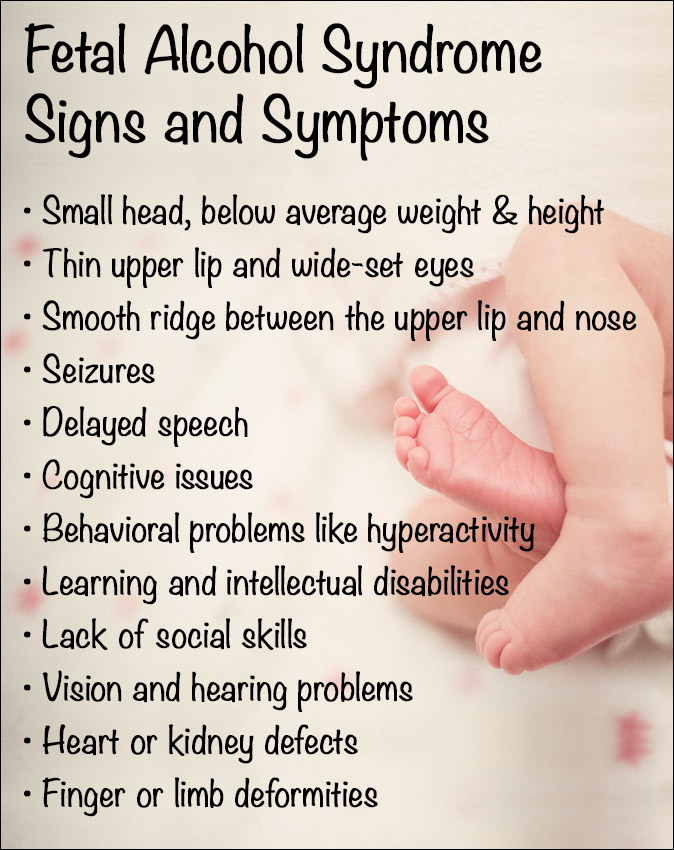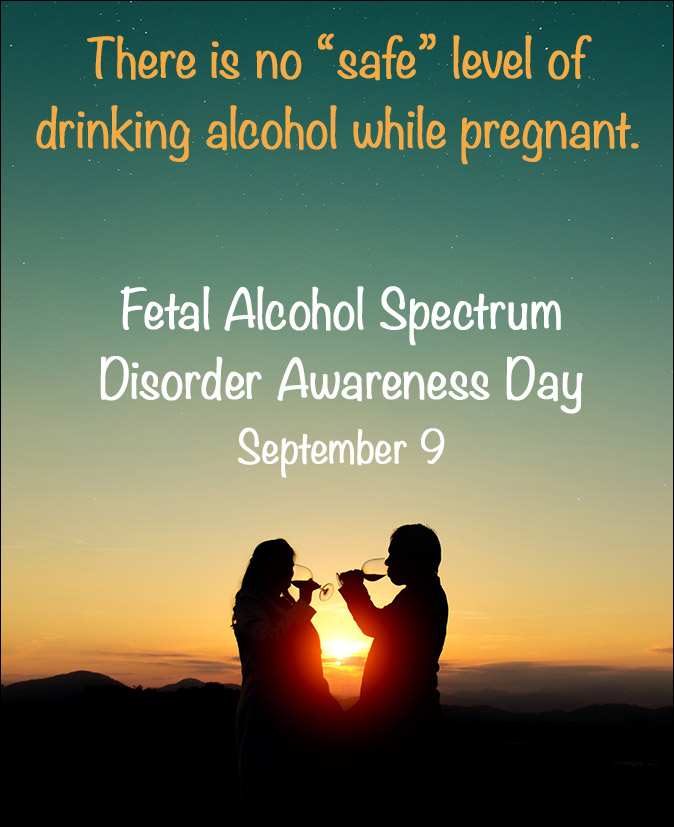Did you know that Fetal Alcohol Syndrome (FAS) is the leading cause of preventable birth defects and developmental disabilities in the United States?
Fetal Alcohol Syndrome can result in a baby being born with altered facial features, lack of coordination, behavioral problems and slow growth.

FAS is the most common type of Fetal Alcohol Spectrum Disorders (FASD) that can occur to an unborn baby in the womb that is exposed to alcohol during pregnancy.
Contrary to popular belief, if a woman doesn’t know that she is pregnant during the first trimester and drinks alcohol, the developing fetus could still develop FASDs. For anyone planning to get pregnant it’s important to completely avoid alcohol.
The exact number of people with Fetal Alcohol Syndrome is unknown. It’s estimated that as many as 1 to 5 (out of every 100) school children in the United States and Europe might have been born with FAS or a FASD.
September 9th is International Fetal Alcohol Spectrum Disorders (FASD) Awareness Day as recognized by The National Institute on Alcohol Abuse and Alcoholism (NIAAA).
We stand firmly behind their core message:
“There is no ‘safe’ level of drinking alcohol while pregnant.”

Types of Fetal Alcohol Spectrum Disorders (FASD)
In the past, Fetal Alcohol Effects (FAE) was used to describe intellectual disabilities and behavioral problems in a person whose mother drank alcohol during pregnancy.
This changed in 1996, when the Institute of Medicine (IOM) replaced FAE with Alcohol-related Neurodevelopmental Disorder (ARND) and Alcohol-related Birth Defects (ARBD).
There are 4 Main Types of Fetal Alcohol Spectrum Disorders
- Fetal Alcohol Syndrome (FAS)
- Alcohol-Related Neurodevelopmental Disorder (ARND)
- Alcohol-Related Birth Defects (ARBD)
- Neurobehavioral Disorder Associated with Prenatal Alcohol Exposure (ND-PAE)
Signs of Alcohol Fetal Syndrome Symptoms
How do you know if a child has a FASD? If a child isn’t meeting the developmental milestones or it’s known that the mother was drinking during pregnancy – a child can be referred to a developmental pediatrician or a genetic specialist to establish whether the child has FAS.
A diagnosis of FAS usually results in one or more of the following physical or behavioral signs of fetal alcohol syndrome symptoms:
- A small head and below average weight and height
- Facial feature abnormalities such as a thin upper lip, wide-set eyes, and a smooth or lack of a ridge between the upper lip and nose
- Seizures
- Delayed development of speech, coordination, or movement
- Cognitive issues related to thinking
- Behavioral problems like hyperactivity or trouble with mental focus
- Learning and intellectual disabilities
- Lack of social skills
- Vision and hearing problems
- Heart or kidney defects
- Finger or limb deformities
Many of these signs and symptoms will be difficult to detect in infancy and often go unnoticed until the child gets older.

How Early in Pregnancy Can Fetal Alcohol Effects Impact a Baby?
There are mixed beliefs about how early in pregnancy fetal alcohol effects can impact a developing baby. Some say that alcohol-related birth defects can begin from conception.
Others have speculated that FAS happens after the third week of development. It’s generally agreed by most medical professionals that there is no safe amount of alcohol to drink during pregnancy.
The amount of alcohol required to cause problems remains unclear – so complete abstinence is advised. Both the American College of Obstetricians and Gynecologists, and the United Kingdom’s Royal College of Obstetricians and Gynecologists advise to avoid alcohol completely during pregnancy.
Unfortunately, many women drink alcohol during the first few weeks when they are unaware that they are pregnant. Some even think it’s okay to have glass of wine occasionally, but when considering the risks, it isn’t worth it.
There are a few studies that share a reassuring sentiment and claim there are usually no adverse effects of drinking a small amount during pregnancy. However, for people with a history of alcoholism, avoiding alcohol during pregnancy is of the utmost importance.
Causes and Prevention of Fetal Alcohol Spectrum Disorders (FASD)
Although people debate the amount of alcohol that can be safely consumed during pregnancy, the simple fact remains – FASDs happen because a woman drinks alcohol during pregnancy.
Fetal alcohol syndrome is caused by drinking alcohol while pregnant and results in brain damage, birth defects and issues related to growth during childhood.
To prevent FASDs do not drink alcohol when pregnant. Better still – avoid alcohol if you are trying to conceive. All doctors agree that fetal alcohol syndrome is completely preventable by not drinking any alcohol during pregnancy.
All forms of alcohol can harm a developing baby. There is no safe time to drink, and no safe type of alcohol for a pregnant woman to consume. To avoid the possibility of damaging a developing fetus, then complete abstinence is the only fail-safe method.
Early screening and rehabilitation programs can help mothers who are finding it difficult to give up drinking when pregnant.
Fetal Alcohol Syndrome Treatment
There is currently no form of fetal alcohol syndrome treatment that can reverse or cure the symptoms. However, early intervention can help a child develop to their fullest potential.
Early intervention is defined as a diagnosis and a treatment plan implemented before 6 years of age. Treatment for the resulting behavior difficulties can also include medication.
There are several protective factors that can help a child with FASDs thrive including:
- A home free of violence
- Special education
- A stable home environment
- Parental love and support

How Alcohol Harms the Developing Fetus
When a pregnant woman drinks alcohol it enters the blood stream. The alcohol then passes through the umbilical cord and into the baby. Drinking alcohol when pregnant can result in miscarriage, stillbirth and an entire range of developmental and cognitive disabilities.
During the first trimester, alcohol can alter the facial features of the baby, resulting in a lack of philtrum (the small ridge between nose and lip) and a small head size.
Alcohol also affects the delicate developing central nervous system (CNS) and can cause attention problems, hyperactivity and poor coordination.
If you or someone you know is finding it hard to stop drinking when pregnant, you’re not alone.
A study in the Morbidity and Mortality Weekly Report found that about a third of pregnant women reported binge drinking. One in 9 pregnant women ages 18 to 44 years old who were surveyed said that they had consumed alcohol in the past 30 days.
Is it Too Late to Stop Drinking?
It is never too late to stop drinking, especially if you are already pregnant. The baby’s brain and central nervous system is continually developing in the womb and will do better in a body that is free from alcohol.
For anyone that is having difficulties trying to stop drinking before or during pregnancy, it’s imperative to seek the help of an alcohol addiction treatment program to unsure the health and safety of the baby, both during and after pregnancy.
It’s never an easy task to quit drinking when someone has a dependence to alcohol. While it may seem prudent to simply quit cold turkey, the stages of alcohol withdrawal can complicate sobriety, in addition to overall health, and should only be attempted with the help of trained professionals.
Hopefully Fetal Alcohol Syndrome Awareness Day on September 9 will increase attention to FAS and FASDs for all women who are either pregnant now or those who are planning to become pregnant in the near future.
Understanding the risks of drinking alcohol during pregnancy is the greatest motivator for prevention.
Related Posts
- Dry Drunk Syndrome and What is a Dry Drunk?
The term Dry Drunk Syndrome, or simply Dry Drunk, refers to a person who quit…
- Wet Brain Syndrome Symptoms and Alcoholism Risks
Wet Brain Syndrome, also known as Wernicke-Korsakoff Syndrome (WKS), is a severe condition that occurs…
- Effects of Alcohol on the Body and Brain
Even though alcohol consumption is widely accepted in society, there are many negative side effects…
